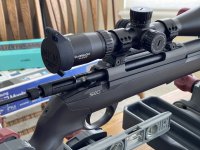Is the necessity of a bore guide a myth? Below is my logical argument:
Copper, nylon, bronze, and brass are softer than steel. This implies that copper, nylon, bronze, and brass cannot scratch or otherwise damage steel. Therefore, a nylon coated cleaning rod, copper fouling, bronze bristles, brushes with brass cores, and other bronze or brass pieces cannot damage the throat, crown, or any other parts of a steel barrel.
Otherwise, please tell me your logical argument as to why I should use a bore guide to prevent damage.
Thank you.
Copper, nylon, bronze, and brass are softer than steel. This implies that copper, nylon, bronze, and brass cannot scratch or otherwise damage steel. Therefore, a nylon coated cleaning rod, copper fouling, bronze bristles, brushes with brass cores, and other bronze or brass pieces cannot damage the throat, crown, or any other parts of a steel barrel.
Otherwise, please tell me your logical argument as to why I should use a bore guide to prevent damage.
Thank you.
Last edited:


